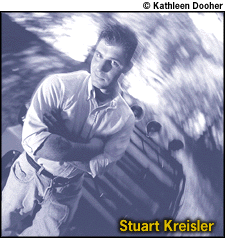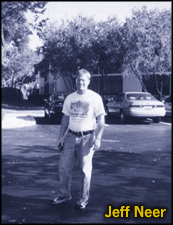![[Sidebar]](/standard/image/sidebar.gif)
August 20 - 27, 1999
![[Features]](/standard/image/headers/features_header.gif)
|
|
|
These days the focus in higher education seems to be on learning by doing. Almost all colleges and universities stress the importance of internships, and many have made them mandatory for graduation. But some students take this concept one step further, suspending their academic studies in order to pursue business interests. A few are even successful (think of Bill Gates). Business lessons
Four entrepreneurs get educated at the school of life
by Leslie Robarge
Four students who took the plunge are profiled below. All say the same thing: starting your own business isn't easy, school contacts have been invaluable in the success of their ventures, and they hope someday to return to school to earn their degrees. (One of them has already done so.) Read on for inspiration -- or for fair warning to stay the course until graduation day.
Pehr Anderson, NBX Corporation
Pehr Anderson admits he is a working illustration of the saying "Ignorance is bliss."
"If I had known what I was really doing, would I have had the gall to do this?" he asks. "It was my ignorance that made it possible."
In 1996, the then 22-year-old was a year and a half away from completing his degree at MIT. He dropped out to start the NBX Corporation. The idea came from a class project for which he had designed telephone-system software that automatically updated existing systems, saving businesses the trouble and expense of doing so themselves. Anderson says that he was driven to turn his idea into a business when he saw that there was nothing like his software already on the market.
"I could see this great product that I wanted my dad to have. I could see it. I wanted them to be able to have this and I thought, `The only reason why they can't have it is because there's nobody pushing the [phone] giants to do this,' " he says.
Anderson's problem wasn't developing a prototype -- he knew he could do that. It was finding someone to head the company. But being at a prestigious technological university made things easier. He teamed up with Alex Laats at the MIT Licensing Center; Laats eventually became the co-founder of NBX.
In 1999, Anderson hit the jackpot (and achieved professional credibility) when 3COM acquired his company, keeping the name NBX -- a move that, for Anderson, confirmed the success and visibility of his venture. And though he won't divulge the exact amount, the equity arrangement made him a millionaire.
After the deal went through, Anderson says, he became even more determined to get his degree, if only to "put a check mark" on his list of unfinished projects. Now 25, he graduated from MIT a year ago and is working for another company, E Ink, developing technology for electronic books. Working 12-hour days for his start-up made him realize what his priorities were, Anderson says. Finishing at MIT and marrying his fiancée seemed far more important than before. Plus, he says, he couldn't keep up the pace.
"Let's put it this way," he says. "I pulled more all-nighters in one year at NBX Corp. than I did in four years at MIT."

Stuart Kreisler, Expedition Outfitters
Who would have guessed that a little beagle named Bailey would be the inspiration for a fledgling company?When Stuart Kreisler's fiancée, Dina, graduated from Boston College in 1998, the two decided to go on a cross-country trip. But Dina didn't want her dog, Bailey, sitting on her lap for 3000 miles, so Kreisler, 27, a junior at Boston College who has enjoyed tinkering and building things since he was a kid, created a roof rack for his Jeep Wrangler. The camping gear went on top of the Jeep; the back seat was reserved for Bailey.
While out west, Kreisler says, he and Dina would find people waiting at their car to ask where they had purchased the rack. After several inquiries, Kreisler realized that his roof rack presented a great business opportunity. When the trip was over, instead of returning to school, Kreisler started Expedition Outfitters.
It hasn't been easy. The company isn't entirely off the ground yet, and Kreisler spends a lot of time marketing the racks to magazines and catalogues for off-roaders. He does custom woodworking to pay the bills, while Dina sacrifices her weekends to help him with the company. Kreisler says he's been unable to get a seed loan. After spending countless hours developing a business plan, even bringing racks into the bank, his proposal was still rejected.
Still, he isn't fazed. Though he's "trying to get back" to Boston College in order to complete his education -- which, he says, gave him the skills to go into business in the first place -- he doesn't regret his decision to leave school. "I couldn't have stayed in school and waited for this. I got some absolutely incredible feedback, and if I didn't develop this, someone else would have," he says.
As for Bailey, well, he liked the racks, but not the back seat. "The irony of the whole thing," says Kreisler, "is that the dog sat in Dina's lap for the whole trip."
Daniel Hoffer, Fúxito.com
The most notable item in Daniel Hoffer's biography on the "Who We Are" page for Fúxito.com -- an Internet site for the international soccer community that includes a recruiting database and an online store -- is not that he's the Chief Technology Officer or the co-founder of Fúxito.com, but that he has "over nine years of experience in working on the on-line communities and the Internet."
Hoffer, a Harvard University dropout, is only 21 years old.
With just one semester left, Hoffer called it quits and joined forces with Richard Powell, a fellow student and co-founder of Fúxito.com. Such a move would be considered extremely bold for most, but not for Hoffer. He started a company when he was just 15, and in college began running the D.M. Hoffer Consulting Company.
Hoffer threw all of his consulting resources into developing the prototype for Fúxito.com. He and Powell spent three weeks collaborating, and then it was ready. Some months later Hoffer moved out to Sunnyvale, California, to get the site going and to establish contacts in Silicon Valley.
Hoffer says that although he is planning to finish his last semester of school eventually, he doesn't regret leaving just a few months short of a degree. "I don't feel like I'm missing out on anything. I've learned more in the last five weeks in being out here than I have learned in 10 years," he says. Fortunately, Hoffer's mother is on board with the plan: "His commitment is 200 percent, and that's what it should be," Anita Hoffer says. "That's what it takes, and if he didn't have the commitment, then I'd be worried."

Jeff Neer, Sunny Daes Ice Cream
Jeff Neer was sitting home in Western Massachusetts one day when his lawyer called from Miami. At the time, Neer was frustrated: he had just left Boston University in order to partner with a local ice-cream-store owner, and the business plans were at a standstill. The lawyer told Neer that he had been walking around Miami one evening looking to buy an ice-cream cone, but he hadn't been able to find a decent place anywhere. Neer flew down to Miami to look into the business opportunities, and a couple of months later, he relocated and went into business with his mother."I'm doing this because I've got nothing to lose," he says. "I want to explore everything. I can't afford not to do that."
Sunny Daes Ice Cream was incorporated in April 1998, a little more than a year after Neer, 23, left BU in the middle of his junior year. Right now, Sunny Daes is a one-man operation: Neer makes the product and distributes and publicizes it to hotels and gourmet markets in the Miami area. Though he does feel a twinge of regret about leaving school and plans one day to return, Neer feels that his education has taken him a long way in his business, and that his business has also taken him a long way in his education.
"My textbooks are finally English to me. Before I started Sunny Daes, they seemed like Japanese," he says. "Now when I re-read them, I finally understand them. I feel like I've learned Japanese."
Neer notes that, had he finished school, his education would have been an investment for himself and for Sunny Daes. "With all of the stuff going on with our expansion, I feel like there are necessary business components lacking," he says. "I can pay accountants and attorneys to do it, but if I had finished my degree, I feel like some of the questions I ask, I could answer myself."
But even so, he doesn't regret what he's doing day to day. "I wake up in the morning and I make ice cream. Give me a break," he says, laughing.
Leslie Robarge is an Online Content Coordinator for the Boston Phoenix.
Copyright © 1999 The Phoenix Media/Communications Group. All rights reserved.